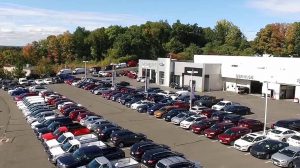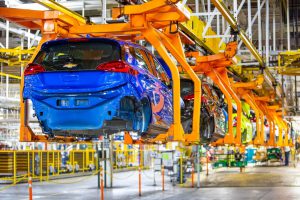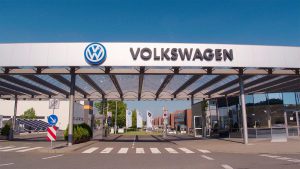
New vehicle sales are expected to take a massive hit, similar to that of the Great Recession last decade.
As bad an impact as the coronavirus pandemic has had on the auto industry already, things are likely only to grow worse in April and possibly, beyond, three leading analysts concluded during a webinar on Friday.
Virtually nothing connected to the industry will escape unscathed, as the latest headlines are making clear, AutoNation, the largest automotive retail chain in the U.S., shuttering showrooms across the U.S. and laying off at least 7,000 employees.
“I think this will have a permanent impact on us,” said Jeff Schuster, lead analyst with LMC Automotive, during a web conference sponsored by the Detroit Automotive Press Association.
(Pressure on automakers rises as shutdown gets extended.)
The impact of the pandemic isn’t limited to the U.S. The outbreak began in China and quickly shut down that country’s auto industry. Chinese plants are just now beginning to ramp up production, but the situation is much more dire in Europe and the U.S. where hundreds of millions of residents are under lockdown and auto production has come to a screeching halt.

Auto plants across the U.S., like General Motors’ Orion plant in Orion Township, Michigan, are shut down for the foreseeable future.
So have new vehicle sales which tumbled about 37% in March in the U.S., according to industry data, with most analysts forecasting the figures could be off 80%, or more, this month. A rebound of any substance isn’t likely until midyear and some forecasts, such as one released by J.D. Power this week, don’t see the U.S. automotive market back to anything close to normal until 2021.
Even that may be optimistic, cautioned Schuster, referencing concerns by the medical community that a second wave of coronavirus outbreaks could hit this autumn.
Even if that doesn’t happen, LMC is currently predicting U.S. sales will plunge from 17.1 million last year to 14.2 million for all of 2020. And that number could drop by as much as 3 million under a worst-case scenario, said LMC’s Schuster, “down to what we saw as the low point of the Great Recession.”
Worldwide, LMC now estimates 2020 sales will plunge from last year’s 90 million to 70 million – and could dip by another 10 million if it takes longer than expected to bring the pandemic under control.
In some markets, “Sales are non-existent,” added Michelle Krebs, senior analyst for Cox Automotive. That includes Detroit and New York, cities hard hit by COVID-19, the disease caused by the coronavirus.

Among Volkswagen’s German plants that are closed is one in Zwickau which was ramping up production of VW’s first long-range EV, the ID.4
There are some exceptions, such as Texas, where sales have been holding up better than expected, in part due to continuing demand for pickups – which have been juiced with record incentives during the last month.
(Fever pitch: coronavirus taking increasing toll on auto industry.)
The analysts who spoke on Friday’s webinar agreed there will be the need for significant incentive programs going forward, possibly including a federal program like the Cash-for-Clunkers campaign that was run by the federal government in 2009, noted Stephanie Brinley, principal auto analyst with IHS Markit. But Brinley also cautioned that the most effective incentives will likely offer buyers “a sense of security” that they will be covered if they lose their jobs. She pointed to the Hyundai Assurance program that offers to cover months of payments if that happen.
For manufacturers like the Detroit Big Three, shutting down both sales and manufacturing is putting a strain on cash as severe, perhaps even worse, than what was felt during the Great Recession, industry analysts warn. Lessons learned a decade ago may be helping the industry weather the coronavirus storm, but the longer it takes things to get back to normal the bigger the risk, warned LMC’s Schuster.
Among other things, he expects to see costly “EV programs will be pushed out and altered by the virus.” Spending on autonomous vehicle development could also take a hit, he added.

This is how new vehicle sales are going to be handled for the next several months, if not into the winter months.
As the industry gets back to work, Schuster believes, there will be a focus on the highest-profit products, such as pickups and large SUVs.
In a separate webinar earlier this week, Tom King, chief data officer for J.D. Power, warned that the pandemic “will be extremely damaging to all industry constituents,” including automakers, parts suppliers, dealers, investors, and pretty much anyone else linked to the car business.
Suppliers often take the brunt of a crisis and that is likely here. They will come under pressure to get parts rolling out quickly once manufacturing restarts, analysts suggest, at the same time automakers likely will squeeze suppliers for price concessions.
The auto industry was expected to go through some dramatic changes over the coming decade, including the debut of autonomous vehicles, as well as the shift from personal ownership to ride-sharing. But companies like Lyft and Uber could face their own challenges if consumers start to question whether getting into a ride-share vehicle might pose a health risk. The pandemic very well may “put a damper” on the growth of the ride-sharing business, cautioned Cox Automotive’s Krebs.
(Car dealers struggling to cope with coronavirus turn to online, “touches” car sales.)
If anything, Americans may start to question whether they want to use not only ride-sharing vehicles but cabs and mass transit, as well. Ironically, that could provide some comfort to the auto industry by boosting the use of personally owned vehicles.
